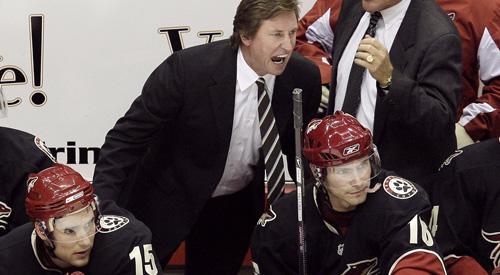
Wayne Gretzky’s life in retirement
As Wayne Gretzky skated around the ice during his final NHL match, there was celebration and sadness wafting through Madison Square Garden. The historic career of “The Great One” was coming to an end. It was a vocation that captivated hockey fans in Canada and the United States. The number 99 became iconic. Children of the 1980s and ’90s would tuck a part of their jersey into their pants, just like their hero.
It has been 10 years since Gretzky ended his playing career. However, he has managed to stay in the spotlight, whether it’s running his Toronto-based restaurant or wrestling against Bret Hart in an infamous commercial for ESSO. More importantly, while he may not be skating up and down the ice or setting up a play behind an opponent’s net, Gretzky has also continued his involvement with professional hockey.
Gretzky served as the executive director of the Canadian men’s hockey team at the 2002 and 2006 Winter Olympics. The results were mixed. Canada captured their first gold medal in five decades at the ’02 games in Salt Lake City. However, the Canadians would finish in a disappointing seventh place, four years later in Turin, Italy. According to Dan Rosen, a staff writer for NHL.com, the results of Team Canada – both good and bad – can be attributed to Gretzky’s leadership.
“He deserves the blame for 2006 and the credit for 2002,” says Rosen. “In my mind, he gets a B+ because Canada won gold for the first time in 50 years, but suffered the embarrassment of 2006. Still, Gretzky will forever be remembered as the man who brought the gold medal back to Canada, where a lot of Canadians feel it belongs, even though the country has won gold only once since 1952.”
[php snippet=1]
Gretzky also put together the Canadian team that lost in the quarter-finals at the 2001 World Hockey Championship, as well as the squad that captured the 2004 World Cup of Hockey. He will serve as an advisor to Hockey Canada’s current executive director, Steve Yzerman, for the 2010 Winter Olympics in Vancouver.
In 2001, after two years of retirement, Gretzky returned to the NHL. This time, he was part of a group that purchased the Phoenix Coyotes. To this day, Gretzky serves as a minority owner and managing partner. Not only does he have presence in Phoenix’s front office, but also behind the bench. In 2005, Gretzky became the head coach of the Coyotes, even though he had no coaching experience. Since becoming Phoenix’s bench boss, Gretzky has accumulated a record of 143-161-24, with the Coyotes missing the playoffs every season. Despite this poor showing, Rosen believes Gretzky is doing a good job and ensures his players feel comfortable with him.
“I think he is a better coach now than when he first started,” says Rosen. “He’s obviously one of the smartest hockey minds out there, but there is a difference when you’re a coach and he’s been learning on the fly. The best thing about him is that he seems to be in this for the long haul; not like Magic (Johnson) or Larry Bird in the NBA. He enjoys coaching and being around the boys, and I think the Coyotes are a team on the verge of turning a corner.”
Professionally, there have also been some negative moments. During the 2002 Olympics, Gretzky was criticized for comments he made after Team Canada’s slow start. In 2006, Gretzky and his wife, Janet Jones, were alleged to have taken part in a gambling ring run by former Coyotes assistant coach (and current Tampa Bay interim head coach) Rick Tocchet. Gretzky and Jones were eventually cleared of any unlawful activity.
The Coyotes have also been having some financial difficulty. A recent article on TSN.ca reported the NHL had taken control of the team. The report was denied by Coyotes president Doug Moss. Meanwhile, Phoenix’s economic troubles have been publicized to the point where relocation has become a strong consideration. Regardless of these off-putting matters, there doesn’t seem to be anything that could tarnish Gretzky’s impact on professional hockey.
“I don’t think anything can tarnish what Gretzky did as a professional hockey player,” states Rosen. “He holds all the records and is widely regarded as the best player of all time. Plus, he put the NHL on the map and had it competing for air time with the NBA and legends like (Michael) Jordan, Magic and Bird. His impact on the game of hockey is still felt because the players playing the game today all followed Gretzky’s footsteps.”
“He was the first marketing machine in the NHL,” Rosen continues. “Now, you see someone like (Sidney) Crosby and realize that if it weren’t for ’99,’ there wouldn’t be an ’87,’ at least in marketing terms.”
There’s no doubt that players like Crosby and Alexander Ovechkin have become the “new faces of the NHL” since Gretzky retired, but one must wonder if the two young stars could ever overtake the Great One’s significance and prestige. Rosen feels Crosby and Ovechkin have made their own noteworthy impact, but it cannot compare to Gretzky’s impact, especially when it comes to promoting the sport in the southern United States. As for prestige, there’s simply no contest.
“I don’t believe anyone can set the standard the way Gretzky did with his marketing of the game and his talent on the ice,” says Rosen. “If the guy never scored a goal, he would still be the leading scorer of all time.”
Wayne Gretzky may have stopped playing a decade ago, but his presence is still felt. It’s hard to imagine what professional hockey would look like had he never played. Perhaps the NHL would exist in a very small capacity (if any). Nevertheless, the Great One’s career has become legendary and from all accounts, his story will be passed down to future generations.
[php snippet=1]

